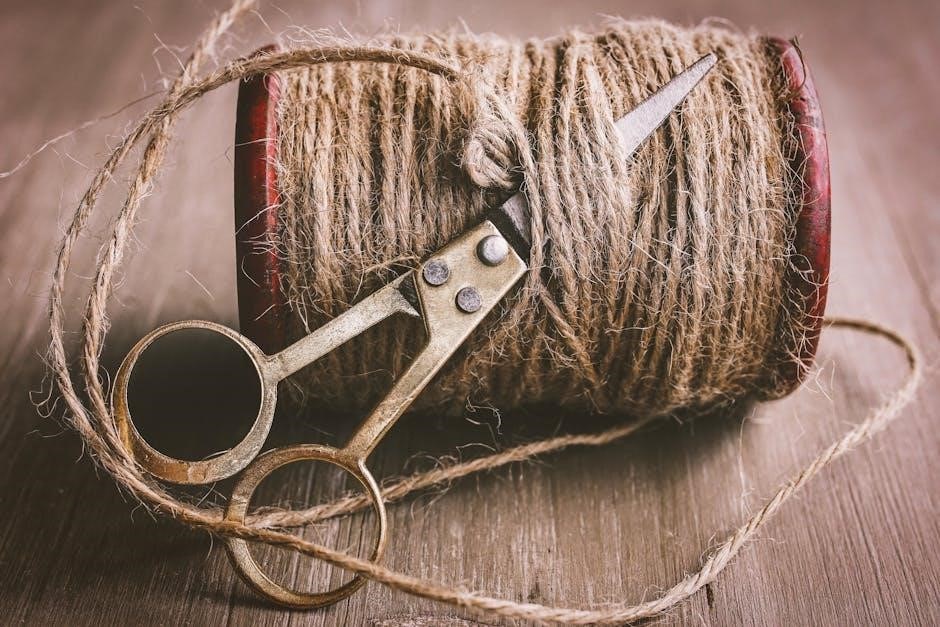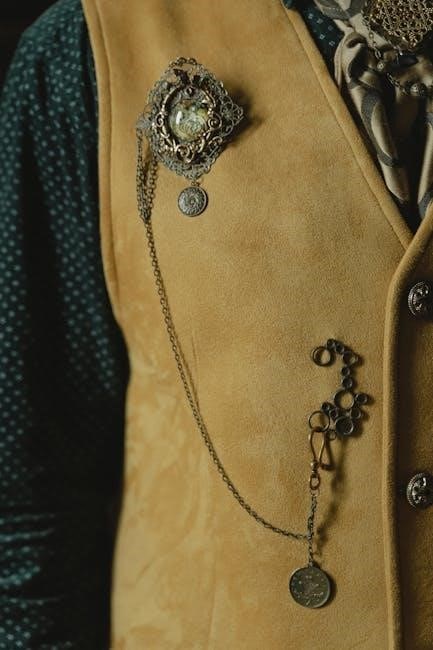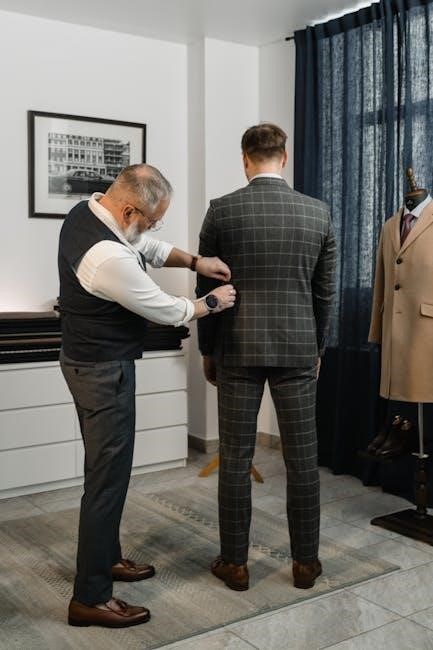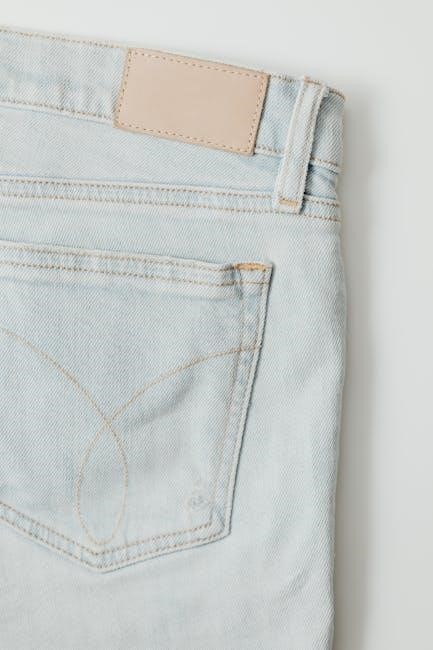Cataclysm Classic Tailoring enables players to craft bags, armor, and specialized items, benefiting cloth-wearing classes. It’s a vital profession for gear enhancement and gold-making in WoW.
Overview of Tailoring in Cataclysm Classic
Tailoring in Cataclysm Classic is a crafting profession focused on creating cloth items, including bags, armor, and magical enhancements. It allows players to craft essential gear for themselves or sell items on the Auction House for gold. The profession is particularly beneficial for cloth-wearing classes like Mages, Priests, and Warlocks. Tailoring requires specific materials such as cloth, threads, and dyes, which can be farmed or purchased. Crafting high-quality items demands careful planning and resource management to maximize efficiency and profitability in the game.
Why Choose Tailoring as a Profession?
Tailoring is a valuable profession in Cataclysm Classic, offering unique benefits for both gameplay and economy. It allows players to craft high-demand items like bags, which are essential for inventory management, and cloth armor for classes like Mages and Priests. Tailoring also enables the creation of special items, such as spellthread and enchants, which can improve gear performance. Additionally, Tailoring provides a lucrative gold-making opportunity through the Auction House, making it a practical choice for players seeking self-sufficiency and financial growth in the game.
Classes and Professions That Benefit from Tailoring
Cloth-wearing classes like Mages, Priests, and Warlocks heavily rely on Tailoring for crafting armor and gear. Non-cloth classes, such as Rogues and Druids, also benefit from bags and specialized items. Pairing Tailoring with Enchanting allows players to craft spellthread, enhancing their gear. Additionally, professions like Herbalism and Blacksmithing complement Tailoring by providing materials for crafting bags and other essential items. This synergy makes Tailoring a versatile and valuable profession for various playstyles in Cataclysm Classic.

Leveling Guide for Tailoring in Cataclysm Classic
Master Tailoring by progressing through Apprentice, Journeyman, Expert, Artisan, and Master ranks. Each phase requires specific materials and recipes to efficiently level up your skill.
Apprentice Tailoring (1-75)
Begin your Tailoring journey with the Apprentice rank, starting at skill level 1 and progressing up to 75. This foundational phase focuses on crafting basic items like bolts of linen cloth and simple gear. Essential materials include Linen Cloth and Coarse Thread, which can be purchased from Tailoring suppliers or farmed from humanoid mobs. Key recipes like Bolt of Linen Cloth and Lineweave Cloak help increase your skill efficiently. Completing these crafts prepares you for the next rank, Journeyman, unlocking more complex patterns and higher-demand items.
Journeyman Tailoring (75-125)
Reaching Journeyman Tailoring unlocks more advanced crafting options, focusing on items like Woolen Cloth and Coarse Thread. This phase emphasizes crafting mid-tier gear and bolts of cloth, essential for both personal use and selling on the Auction House. Recipes such as Woolen Cloak and Bolt of Woolen Cloth are crucial for skill progression. Farming Wool Cloth from higher-level mobs ensures a steady material supply. This rank prepares you for Expert Tailoring, where more complex and valuable items become available, enhancing your character’s gear and crafting capabilities significantly.
Expert Tailoring (125-200)
Expert Tailoring introduces higher-tier recipes, focusing on Silk Cloth and Mageweave Cloth; Crafting items like Silk Cloth and Mageweave Bracers becomes essential for progression. This phase requires significant farming of Silk Cloth, often found in contested zones. Recipes such as Mageweave Cloak and Bolt of Mageweave are key for skill advancement. Expert Tailoring sets the foundation for Artisan-level crafting, enabling the creation of endgame gear and high-demand items, making it a critical step in mastering the profession for both PvE and PvP purposes.
Artisan Tailoring (200-300)
Artisan Tailoring unlocks advanced recipes, focusing on high-end gear and specialty items. This phase requires farming Felcloth and Runecloth, which drop from higher-level mobs. Crafting Felcloth Robe and Runecloth Bag are key for skill progression. Artisan Tailoring is crucial for creating gear for endgame content, including raids and PvP. Recipes like Felcloth Gloves and Runecloth Pants remain in high demand. This stage is essential for tailors aiming to support their guilds or generate gold through the Auction House, making it a cornerstone of the profession’s endgame potential.
Master Tailoring (300-350)
Master Tailoring is the final stage, unlocking high-end recipes for epic gear and specialty items. Players must farm Frostweave and Embersilk to craft items like Frostweave Bags and Embersilk Bags. These bags are highly sought after for inventory management. Additionally, tailors can craft powerful armor pieces, such as Epic Cloth Chestpieces, which boost stats and resistances. This stage is critical for raiders and PvPers, as the crafted items provide significant advantages. Master Tailoring also offers lucrative opportunities through the Auction House, making it a valuable skill for endgame progression and gold-making.

Trainers and Locations
Tailoring trainers like Erin Kelly in Stormwind and Melynn in Orgrimmar teach all tailoring ranks. They are located in major cities, offering easy access to skill progression.
Where to Find Tailoring Trainers
Tailoring trainers are located in major cities across Azeroth. Erin Kelly can be found in Stormwind’s craft district, while Melynn is in Orgrimmar’s Valley of Honor. Jormund Stonebrow resides in Ironforge, and Refik is in Darnassus. These trainers offer all tailoring ranks, including Apprentice, Journeyman, and higher. Players can learn new recipes and progress their skills by visiting these NPCs. Ensure your character meets the level requirements before attempting to train higher ranks. These trainers are essential for unlocking advanced tailoring techniques and specializations.
Requirements for Training Higher Ranks
Training higher tailoring ranks requires meeting specific level and skill thresholds. Journeyman Tailoring becomes available at level 10, while Expert, Artisan, and Master ranks unlock at higher levels. Players must also have a sufficient tailoring skill level to learn new ranks. Not all trainers offer every rank, so it’s essential to find the right NPC for your needs. Ensure your character meets the level and skill requirements before attempting to train higher ranks. This progression system ensures a steady advancement in tailoring capabilities, allowing players to craft more complex items as they progress.

Materials and Crafting Essentials

Essential materials include Linen Cloth, Wool Cloth, and Silk Cloth. Coarse Thread is also required for crafting. Gather these items to ensure smooth progression in tailoring.
Required Materials for Leveling Tailoring
Linen Cloth, Wool Cloth, and Silk Cloth are primary materials for leveling tailoring. Linen is used early on, while Wool and Silk become essential as you progress. Mageweave Cloth is also crucial for higher-level recipes. Coarse Thread, available from tailoring suppliers, is a must for crafting. Stockpile these materials to ensure uninterrupted progression. Farming cloth from humanoid mobs or purchasing from the Auction House can help maintain a steady supply. Proper resource management is key to efficiently leveling your tailoring skill;
Optimizing Crafting with Auction House Strategies
Monitor Auction House prices to craft items in high demand. Buy materials like cloth and thread at lower prices to maximize profit. Timing your sales during peak hours can increase revenue. Crafting bags and cloth armor are consistently profitable. Use addons like Auctioneer to analyze trends and undercut competitors effectively. Purchasing materials in bulk during low-demand periods can save gold. Focus on crafting items with the highest demand, such as bags for inventory expansion. This approach ensures efficient gold-making while leveling your tailoring skill.

Crafting Bags and Armor
Crafting bags like Mooncloth and Frostweave bags is essential for inventory management. Tailoring also allows players to create armor for cloth-wearing classes, enhancing their in-game performance.
Best Recipes for Crafting Bags
Crafting bags is a cornerstone of Tailoring, offering practical benefits for inventory management. Key recipes include the Mooncloth Bag (20 slots) and Frostweave Bag (18 slots). These require materials like Frostweave Cloth, Mooncloth, and Eternium Thread. Higher-level bags such as the Embersilk Bag (22 slots) and Illusionary Bag (26 slots) provide even more storage. These recipes are highly sought after, making them excellent for gold-making on the Auction House. Prioritizing these will ensure you meet your own needs while supplying demand.
Popular Armor Recipes for Different Levels
Tailoring offers versatile armor recipes for various levels, enhancing character survivability and spellcasting. Early-game options include Mageweave Armor, providing decent stats for mages. Mid-level recipes like Frostweave Robes and Spellfire Robes boost stamina and spell power. High-level craftables such as Sunfire Robes and Spellstrike Robes are sought after for their superior stats. These recipes are ideal for equipping yourself or selling on the Auction House, making Tailoring a valuable profession for both personal use and profit.

Tips for Efficient Leveling
Optimize cloth farming, use Auction House for materials, craft in bulk, and plan sessions to minimize waste, ensuring efficient progression through Tailoring levels.
Farming Cloth and Managing Resources
Farming cloth is essential for leveling Tailoring efficiently. Focus on gathering Linen Cloth in early levels, followed by Wool Cloth, Silk Cloth, Mageweave Cloth, and Runecloth as you progress. Key farming zones include Westfall, The Hinterlands, and Stranglethorn. Use your Auction House to supplement scarce materials or sell excess cloth for gold. Proper resource management ensures you avoid wasting materials. Stockpile cloth in advance and plan crafting sessions to minimize delays. Pairing Tailoring with Enchanting can also help convert unwanted gear into additional cloth, optimizing your resource utilization and crafting efficiency.

Optimizing Crafting for Maximum Efficiency
To maximize crafting efficiency in Cataclysm Classic Tailoring, plan your crafting sessions in advance and prioritize high-demand recipes. Focus on crafting items with the highest return on investment, such as bags and popular armor sets. Use the Auction House to identify market gaps and adjust your production accordingly. Always craft in bulk to minimize material waste and reduce travel time between vendors. Keep your skill level high to reduce crafting failures and ensure optimal resource use. By organizing your crafting schedule and adapting to market trends, you can achieve maximum efficiency and profitability in your Tailoring journey.

Advanced Tailoring Techniques
Master specializations like Mooncloth or Shadoweave for unique crafting advantages. Experiment with rare materials and intricate patterns to create high-end gear, enhancing your gameplay experience.
Specializations and Their Benefits
In Cataclysm Classic, Tailoring specializations like Mooncloth and Shadoweave offer unique crafting advantages. Mooncloth specializes in spell power gear, ideal for casters, while Shadoweave focuses on stamina and agility, benefiting healers and agility-based classes. These specializations allow tailors to craft high-demand items tailored to specific playstyles. Choosing the right specialization can significantly enhance your crafting efficiency and profitability. Each path unlocks exclusive recipes, making it a strategic choice for players aiming to excel in PvE or PvP content. Specializations add depth to Tailoring, catering to diverse class needs and gameplay preferences.
Endgame Tailoring and Its Applications
At endgame, Tailoring becomes crucial for crafting high-end armor, bags, and magical enhancements. Players can create exclusive items like the Royal Mooncloak, offering unique stats for casters. Tailoring also enables crafting of 22-slot bags, essential for inventory management. Specialized gear for healers and spellcasters makes Tailors sought after in raids and dungeons. Additionally, crafting epic gear for resale on the Auction House provides a lucrative gold-making opportunity. Endgame Tailoring enhances both gameplay efficiency and economic success in Cataclysm Classic, making it a valuable profession for long-term progression and profitability.
